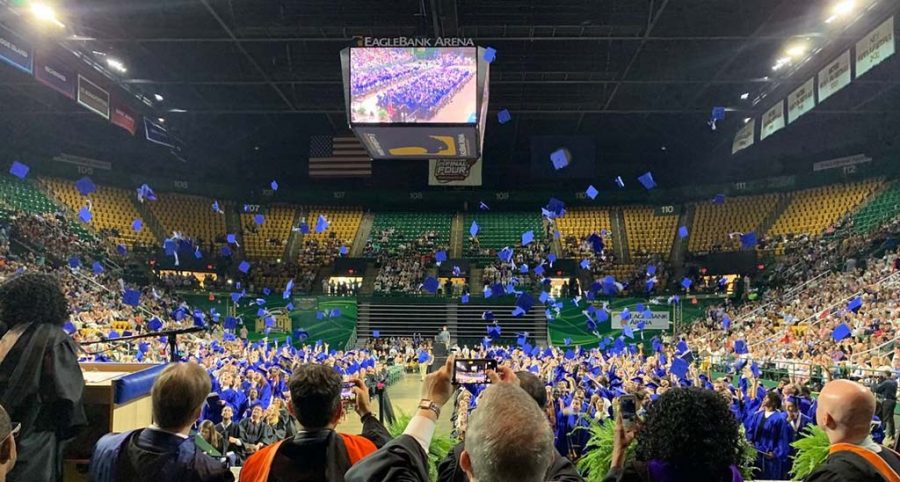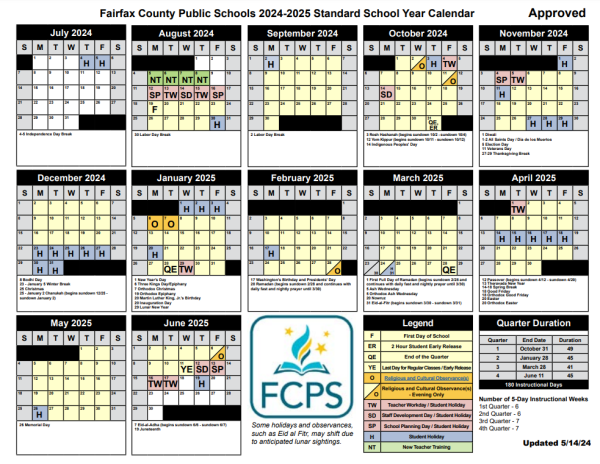SENIOR DUES: WHERE DOES THE MONEY GO?
Photo courtesy of coveringthecorridor.com
Graduation at the Eagle Bank Arena
The auditorium is full of seniors lamenting the absence of donuts awaiting them at the end of yet another senior meeting. Meanwhile, important announcements are being made. The topic of senior dues comes up, but most people are either dozing off or on their phones. They catch some bits like “80 dollars” and “subschool four.” At this point, a discussion may break out among those still awake, inquiring each other why both the school and colleges are trying to rip them off during their senior year.
Seniors have to spend money on transcripts, college application fees, SAT, prom, and now, senior dues. But what do senior dues even pay for? And does it really cost that much or is the school trying to rob them as a welcome to an adult life?
There have been some rumors that a portion of senior dues goes to prom. However, Meredith Norris, the administrator sponsor of the class of 2020, assures, “Senior dues do not have anything to do with prom. All $80 go towards graduation.”
Graduation is expensive, that is a fact.
Andrew Donnelly, the teacher sponsor of the class of 2020, reveals that graduation costs about $50,000.
Expenses include the rental of the Eagle Bank Arena, caps and gowns, programs, floral arrangements, police detachments, color guard, dignitaries, diplomas, diploma holders, and trucks to move the band.
Norris shares that venues are the most expensive part of organizing any event, be that prom or graduation, with prices between 20 to 30 thousand dollars. The hotel where the prom is held is around $26,000. That is why prom tickets are $60.
“No one makes a profit out of it. It’s literally used to pay the bills,” expounded Norris.
Moreover, according to the Falls Church High School website, the school system does not give the schools funds for activities like graduation, therefore each school has to find tens of thousands of dollars for funding all by itself. And the only way besides fundraising is collecting senior dues.
Bella Rubijino, 12, explains that there is only so much you can get from fundraising: “They will say, ‘Okay, depending how many people you get, you can get ten percent of whatever we make tonight.’ And so if we compare it to senior dues, which is straight $80, no strings attached to it – senior dues are the easier way.”.
Fundraising in school is also limited. The class board made $300 by selling candy grams last year, but then some of that amount had to go towards buying the supplies.
“SGA makes all the profits that they need during the homecoming dance. That’s how they fund for the rest of the year. Versus class boards, we are a separate organization and we have to make all of our fundraising by ourselves and because we’re such a small organization, we don’t have the same capacity of hosting a dance and then having it as our fundraising event.”
Another way the class board gets money is when the senior class graduates and they still have some funds left over, the money gets transferred into the new class account. Therefore the class of 2020 got leftovers from the class of 2015.
“If it were me I would try to find a way for a local government to pitch in or having other clubs like student leadership help with that funding, thus lowering student dues,” Rubijino presents an alternative, “but that’s not really a thing that people do, so that’s why [the dues] are so high at $80.”
Rubijino offers a helpful idea: if the school board could find another source of money, the weight would be lighter on the students.
One might still think that $80 is an overkill, yet other FCPS schools, like Falls Church HS and Centreville HS, collect $100, Chantilly HS and Robinson HS collect $110 and South Lakes HS collects an astonishing $115.
Westfield also used to have $100 dues, and $80 was a discounted price for people with free and reduced lunches. However, the school decided to just make it an $80 for everyone, which doesn’t sound quite fair to the people who are not as well off economically. The option the school presents instead is paying in installments – $20 this month and $20 the next month, or whatever schedule works as long as the money gets turned in by June 1st.
A question arises: what happens if one doesn’t pay? The answer is simple – he or she doesn’t walk at the graduation.
“Another thing that might prevent you from walking is overdue books,” added Donnelly, “Well that and being suspended.”
Not everyone can pull out $80 out of their pocket, but that’s what it costs to leave school as a royalty and not as a peasant. And if you are a junior, start saving.






